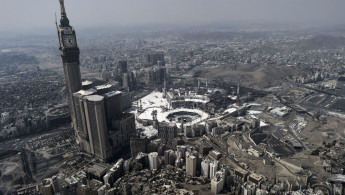Saudi Arabia receives group on UAE terrorist list
Saudi Arabia receives group on UAE terrorist list
By inviting representatives from the International Union of Muslim Scholars to attend a conference on counter-terrorism, the kingdom risks angering the UAE.
2 min read
The counterterrorism conference was held in Mecca [AFP]
Saudi Arabia has hosted an international conference in Mecca on counter-terrorism from a Muslim perspective organised by the World Muslim League. The event, entitled "Islam and the Fight against Terrorism", focused on the kingdom's efforts to reduce the spread of armed groups.
Held under the patronage of King Salman, the conference was attended by more than 400 participants from across the Muslim world. But among the more controversial attendees was Ali Mohiuddin Qara Daghi, secretary-general of the Qatar-based International Union of Muslim Scholars (IUMS), a group blacklisted by the UAE.
By allowing IUMS representatives to participate, Saudi Arabia was in direct contravention of the UAE's rules around its new "terror list" which includes the union, along with 82 other organisations.
The conference discussed the concept of terrorism and the conflicting ways it is defined by different individuals and groups.
Participants focused on the difference between armed struggle against foreign occupation and terrorism. They also made a clear distinction between jihad practiced by Muslims during the early years of Islam and modern day acts of terror or religious terrorism.
In November 2014, the IUMS headed by Sheikh Youssef Qaradawi called on the UAE's to reverse its ban on the group. Qaradawi issued a statement saying that, since its foundation in 2004, the union had fought extremism, violence and terrorism - and had condemned the actions of many terrorist groups.
The Doha-based group also criticised the UAE's list for failing to include many terrorist groups based in Muslim and non-Muslim countries, and questioned why some groups had been selected over others.
This article is an edited translation from our Arabic edition.
Held under the patronage of King Salman, the conference was attended by more than 400 participants from across the Muslim world. But among the more controversial attendees was Ali Mohiuddin Qara Daghi, secretary-general of the Qatar-based International Union of Muslim Scholars (IUMS), a group blacklisted by the UAE.
| The conference discussed the concept of terrorism and the conflicting ways it is defined by different individuals and groups. |
The conference discussed the concept of terrorism and the conflicting ways it is defined by different individuals and groups.
Participants focused on the difference between armed struggle against foreign occupation and terrorism. They also made a clear distinction between jihad practiced by Muslims during the early years of Islam and modern day acts of terror or religious terrorism.
In November 2014, the IUMS headed by Sheikh Youssef Qaradawi called on the UAE's to reverse its ban on the group. Qaradawi issued a statement saying that, since its foundation in 2004, the union had fought extremism, violence and terrorism - and had condemned the actions of many terrorist groups.
The Doha-based group also criticised the UAE's list for failing to include many terrorist groups based in Muslim and non-Muslim countries, and questioned why some groups had been selected over others.
This article is an edited translation from our Arabic edition.



